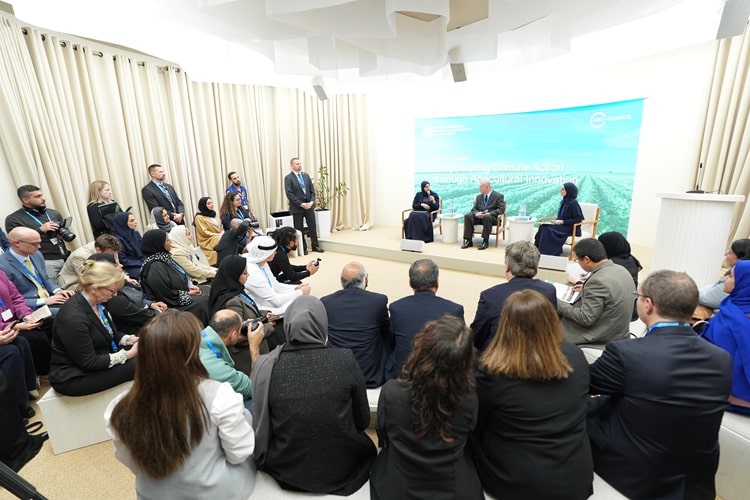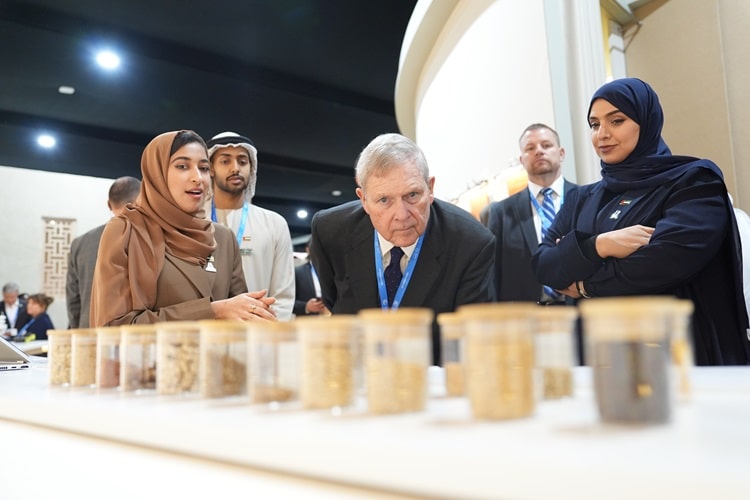- AIM for Climate’s footprint expands to historic proportions as it approaches its sunset: from $17 billion to $29.2 billion in increased investments, 129 Innovation Sprints, and over 800 partners worldwide.
- AIM for Climate co-leads U.S. Secretary of Agriculture Tom Vilsack and UAE Minister of Climate Change & Environment, Her Excellency Dr. Amna bint Abdullah Al Dahak host COP 29 events at UAE Pavilion (18 November), U.S Center (19 November), and 3rd AIM for Climate Ministerial Meeting (20 November)
- COP 29 announcements coincide with the presentation of the AIM for Climate Report “Cultivating Transformative Investments in Climate-Smart Agriculture and Food Systems Innovation”, which outlines strategic pathways for AIM for Climate partners to drive partnerships, investments, and innovations into 2025 and beyond.
Baku, Azerbaijan COP 29: The Agriculture Innovation Mission for Climate (AIM for Climate), the largest global coalition at the intersection of food security and climate change, spearheaded by the United Arab Emirates and the United States, today announced nearly double the investments, partners, and Innovation Sprints in transformative climate-smart agriculture and food systems innovation. The announcements were made at the 29th United Nations Climate Change Conference (COP 29), hosted in Baku, Azerbaijan under the theme “In Solidarity for a Green World.”
AIM for Climate partners turn ambition into action, driving climate-smart agriculture and food systems innovation to tackle the climate crisis, build resilience, and deliver co-benefits for people and the planet. Building on a record year at COP28, investments have surged from $17 billion to an unprecedented $29.2 billion, over a 2020 baseline. The addition of 52 new Innovation Sprints, bringing the total to 129, further underscores AIM for Climate’s transformative impact. With AIM for Climate expanding from 600 to over 800 partners worldwide, the initiative reflects the urgency and strength of its mission.
The investment increase comprises $16.7 billion from 56 Government Partners and $12.5 billion from the accelerated investments of 129 Innovation Sprint Partners, driving change in climate-smart agriculture and food systems. The growing number of high-impact, private-sector, and public-private partnership-led projects deliver solutions to today’s climate and food challenges. Aligned with COP 29’s priorities of climate finance, emission reduction, and developing adaptive solutions for climate-related loss and damage, these initiatives focus on one or more of AIM for Climate’s focal areas: Smallholder Farmers in Low- and Middle-Income Countries; Emerging Technologies; Agroecological Research; and Methane Reduction.
The latest investments, partnerships, and Innovation Sprint announcements were unveiled by AIM for Climate co-leads U.S. Secretary of Agriculture Tom Vilsack and UAE Minister of Climate Change & Environment, Her Excellency Dr. Amna bint Abdullah Al Dahak, at the UAE Pavilion, COP 29 on Monday 18 November. Dignitaries at the event emphasized the critical need for bold, innovative solutions and highlighted AIM for Climate’s impactful role in fostering resilient agricultural and food systems practices through collective investment and partnerships to address climate change and advance global food security.
Following announcements at the UAE Pavilion, the U.S. Center will host a high-level panel: “AIM for Climate: Mobilizing Climate-Smart Agriculture and Food Systems Innovation for a Food Secure Future” on 19 November. Moderated by Jaime Adams, Senior Advisor, U.S. Department of Agriculture, AIM for Climate co-leads will interact with newly announced Innovation Sprint leads, John Tauzel, Senior Director, Global Agriculture Methane, Environmental Defense Fund, Ismahane Elouafi, Executive Managing Director, CGIAR, and Petter Østbø, Founder/CEO Atlas Agro. The event also coincided with COP 29 Agriculture, Food, and Water Day, highlighting the vital connections between these sectors within the context of climate change.
As AIM for Climate prepares to sunset in 2025, AIM for Climate partners are urged to build on achievements by institutionalizing progress for a resilient, food-secure future. The 3rd AIM for Climate Ministerial, co-hosted by the UAE and U.S. on 20 November at COP 29, will highlight AIM for Climate’s lasting legacy and continued momentum with the presentation of the AIM for Climate Report “Cultivating Transformative Investments in Climate-Smart Agriculture and Food Systems Innovation”, developed in collaboration with the United Nations Foundation. This report encourages ongoing partner advocacy and investment in climate-smart agriculture and food systems innovation, providing a roadmap for continued action in 2025 and beyond.
During the Ministerial, report insights will be shared, covering investment barriers, successful case studies, and four recommendations to partners for sustaining AIM for Climate’s progress in climate-smart agriculture and food systems innovation:
Recommendation 1: Enhance Inclusion of Climate-Smart Agriculture and Food Systems Innovation in NDCs Design and Implementation:
Governments are urged to integrate climate-smart agriculture and food systems innovations into the design and implementation of NDCs, making them central to national climate strategies and addressing food security challenges.
Recommendation 2: Normalize Increased Investments in Support of AIM for Climate as New Budgetary Baselines:
The report advocates for sustained, normalized investments in climate-smart agriculture and food systems innovations, establishing increased budgetary baselines in 2026 and beyond to ensure long-term sustainability and resilience.
Recommendation 3: Build Global Partnerships to Overcome Challenges and Scale Agricultural Innovation:
Global partnerships between governments, the private sector, and civil society are essential for overcoming technological and financial barriers to agricultural innovation. Initiatives like AIM for Scale are highlighted as pivotal to expanding the reach of climate-smart innovations.
Recommendation 4: Scale Public-Private Partnerships:
Robust public-private partnerships (PPPs) are crucial to leveraging private-sector investments and scaling agricultural innovations. The report emphasizes the need to foster PPPs to achieve the full potential of AIM for Climate’s goals.
AIM for Climate was launched by the President of the United States at the 26th United Nations Climate Change Conference (COP 26). AIM for Climate recognizes the wide range of participants necessary to achieve its goal and seeks to draw on diverse knowledge, experiences, and cultures.





